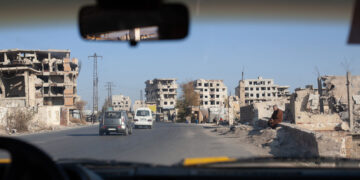Nabeel Nowairah is an independent analyst focusing on the politics and geopolitics of Yemen and the countries of the Gulf Cooperation Council. He has been both a Fulbright Scholar to the U.S. and a Chevening Scholar in the U.K. Follow him on Twitter @NabeelNowairah.
عربي
Intensifying diplomatic efforts to implement a cease-fire in Yemen could finally pave the way for an end to the more than six-year war. Yet despite reported progress in talks between Houthi rebels, supported by Iran, and the Saudi-led coalition fighting them, the war has planted the seeds for potential future conflicts among Yemenis themselves. Yemenis are now more divided than ever, and it is unlikely that one party can take control of the country in a postwar settlement while excluding others. But that is just what the Houthis and rival forces are looking to do.
Hundreds of thousands of Yemenis have been killed since the Saudi-led coalition first intervened in Yemen in March 2015, after the Houthis, also known as Ansar Allah, took control of Sana'a and other parts of the country and forced the internationally recognized government of President Abdrabbuh Mansur Hadi to flee the capital. The war has destroyed large swaths of Yemen's infrastructure, left its economy in tatters, and led to the world's worst famine in decades.
Outside powers, including the new administration in Washington, now finally appear to realize that the war is no longer winnable militarily, and that if it continues, it will only aggravate the suffering of Yemeni civilians. In his first month in office, President Joe Biden halted U.S. support for Saudi offensive operations in Yemen and appointed a special envoy to facilitate a diplomatic resolution among the different warring parties, with a cease-fire deal seen as an initial step. Oman has also played a mediating role. The U.S. envoy, Timothy Lenderking, recently met with Omani, Saudi and Yemeni officials in Riyadh to try and hash out a deal. But it still might be a matter of months before these latest talks produce concrete and positive results on the ground in Yemen.
Even if they strike a deal for a cease-fire and make other progress, underlying factors of instability in Yemen resulting from this war will live on for much longer. There is practically no consensus among Yemenis inside the country and abroad on any issue; people are more divided and polarized than they were decades ago, after Yemen was formally united in 1990 between north and south. Before this war, many ordinary Yemenis never cared about the different religious sects in their community, including their own. As I jokingly told a Yemeni friend recently, I was surprised when I came to find out that he was Zaidi. "To be honest, I was surprised myself," he replied.
Yemenis used to pray in the same mosques and go to the same gatherings without questioning everyone's religious doctrine. But now, the social epidemic of sectarianism is slowly plaguing society, and it's easily noticeable in daily interactions. This is principally caused by the rhetoric accompanying the war, where every party is using sectarian and religious discourse to discredit the other. Given Yemen's largely tribal society, the large number of deaths caused by all the warring parties and the resultant grievances also cannot be easily forgotten. Revenge killings were a problem well before the war; some tribal conflicts in Yemen involving cases of revenge have taken decades to resolve. Even if there is a cease-fire or some kind of peace deal, the war's death toll and calls for revenge between different tribal factions in Yemen will be sources of more instability.
And even while diplomatic talks are underway, some Yemeni parties are still trying to maximize their control on the ground militarily, in order to have a better position at the negotiation table and in a potential postwar Yemen. There have been a number of attempts in recent weeks by the Houthis, for example, to seize the city of Marib, extending their areas of control.
The Houthis clearly hope to be the dominant force once the war is eventually resolved. Yet it will be very difficult for any party to fully control Yemen while sidelining others. The war's current landscape—with the Houthis controlling the heart of the country, from Saada in the north to the edge of Taiz in the south; Hadi's government or pro-government forces controlling parts of the south and east; and the separatist Southern Transitional Council controlling Aden and parts of Lahj and Abyan—is unlikely to be sustainable after the fighting is finally over, given what is motivating many of those groups.
A number of prominent Yemeni tribes have sided with the Houthis against the Saudi-led coalition, but they are really fighting against foreign intervention, rather than as allies of the Houthis. The Houthis and their disparate backers in Yemen have built their rhetoric on the necessity of defending the country against foreign aggression, regardless of their own internal differences. A foreign military presence is a red line for many Yemenis, especially in the north of Yemen, which has a long and bloody history of repelling foreign invaders, going as far back as the Ottoman era. Even former President Ali Abdullah Saleh, after ruling for more for than three decades until 2011, found himself with no tribal support when he publicly turned against the Houthis, his former allies, in late 2017. Saleh had expressed his willingness to open a "new page" with Saudi Arabia and other neighboring countries that had launched their war in Yemen; within 48 hours of making that statement, he was killed by Houthi gunmen.
Foreign interference in Yemen provokes such universal backlash that some tribes who have not backed the Houthis have at least stayed neutral, rather than instead support Hadi's Saudi-backed government or the separatist Southern Transitional Council in Aden, which is supported by the United Arab Emirates. But that may shift if there is actually an end to foreign military intervention. There have long been various competing local powers in Yemen, and the war has created even more of them. Any attempt to marginalize some of these actors over others will only expose the country to more unrest. Saleh's 33-year rule was characterized by balancing these competing powers and often playing them against each other. Without that, Saleh would never have made it as long as he did.
For all the uncertainty around the current diplomatic attempts to end Yemen's war and what a resolution might look like, it is almost certain that the conflict will have grave generational consequences for the country. The war has fueled divisions that won't disappear with a peace deal. In addition to underlying tensions among Yemenis and heightened sectarianism in the war's wake, there will inevitably be more involvement by foreign actors, like Saudi Arabia, Iran and the UAE, in the politics of postwar Yemen, even if they end their military intervention. There will be no victor in this war, and no one in Yemen will be able to dominate the scene whenever the fighting ends. But that won't stop Yemen's rivals from attempting to, which could tear the country further apart.
![]()
Photo credit: Houthi rebels inspect the damage after a reported airstrike by the Saudi-led coalition targeting the presidential palace in the Yemeni capital, Sanaa, Dec. 5, 2017. (Photo by Mohammed Huwais/AFP via Getty Images)





































